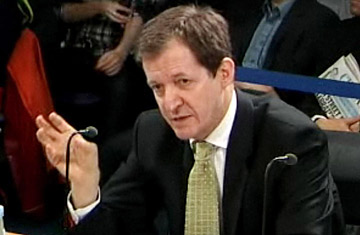
Alastair Campbell, communications chief for former British Prime Minister Tony Blair, speaks at the Iraq inquiry
Warmth, shelter and free entertainment: it's a compelling offer for Londoners facing a chilly age of austerity. But the capacity crowd that queued before dawn to attend Britain's seven-week-old Iraq inquiry as it prepared to welcome its first headline act, former Labour premier Tony Blair's communications supremo Alastair Campbell, sought more than respite from the cold. "I'm here because I hold this man partly responsible for that terrible, terrible war," explained a retired therapist, shivering in her tweed coat.
The inquiry is charged with identifying the lessons from the tangled processes that led to war and the serial failures to plan adequately for its aftermath. Campbell, Blair's most influential adviser from before the Labour landslide victory in 1997 until Campbell's September 2003 resignation, was at the heart of those processes and witness, if not co-author, of those failures. But spectators scanning his craggy face and acerbic testimony for signs of contrition will have been sorely disappointed. What they got was an unyielding defense of Britain's role in the Iraq conflict and a tantalizing hint of bigger revelations to come when the former Prime Minister submits himself to the inquiry, sometime in the two-week period commencing Jan. 25.
Blair's star turn is expected to be so heavily subscribed that the inquiry has launched a public ballot for seats. A key question will be at what point the British government gave pledges to Washington about taking part in military action. The inquiry panel's questions to Campbell revealed for the first time the existence of private letters in 2002 from Blair to U.S. President George W. Bush. The "tenor" of these letters, said Campbell, was "We are going to be with you making sure that Saddam Hussein faces up to his obligations and that Iraq is disarmed. If that cannot be done diplomatically and it is to be done militarily, Britain will be there."
That assurance was given at a time when Blair was publicly pushing the U.N. to force Saddam into compliance. Campbell denied any lack of sincerity in the efforts to secure a solution through the U.N. The former spin doctor has already given evidence to a number of inquiries with narrower investigative remits and has published a thick volume of his diaries. His central narrative remains consistent: Blair believed there was a growing threat from Saddam's weapons of mass destruction; he worked hard for a peaceful solution and to steer an overeager Washington away from precipitate action against Iraq. Campbell told the inquiry of British efforts in the months after 9/11 to remind their U.S. allies, "Hold on a minute: this is about the Taliban. This is about Afghanistan." Only when the diplomatic route had been blocked by French intransigence at the U.N. did Blair reluctantly conclude that military action was unavoidable, according to Campbell.
The former British official appeared just an hour after an inquiry in the Netherlands criticized Dutch Prime Minister Jan Peter Balkenende for backing the Iraq invasion on the basis of dubious legal reasoning. The commission set up by the Dutch government to probe the run-up to the war found that Balkenende's then caretaker administration blithely accepted foreign assurances about Iraq's WMDs, even though Dutch intelligence agencies were "more reserved" in their assessments.
At the time, Balkenende said that Saddam consistently flouted U.N. resolutions, but the inquiry's 550-page final report insisted that there was no U.N. mandate for the attack. "There was insufficient legitimacy" for the invasion, commission chairman Willibrord Davids said. Although the commission quashed rumors that the Netherlands played a military role in the invasion, it is still expected to embarrass Balkenende for offering vital political support despite flimsy evidence of Iraq's threat.
At Britain's inquiry, Campbell said that blame for inadequacies of postwar planning lies partially with the Pentagon, which was "taking a lead on almost every level" and neglecting to look beyond the military campaign until Blair began "rattling cages." Campbell also cast aspersions on some members of Blair's team, describing that cabinet as a "collection of characters of variable competence." But Campbell's fiercest animus was reserved for the British press, whom he holds responsible for stirring up controversy over two dossiers published to strengthen the case for taking action against Saddam. "Evidence" in the second dossier, published in February 2003, turned out to have been plagiarized from an article in a Middle Eastern journal. But it was the first dossier, presented as intelligence information about Saddam's weapons capability and distributed to members of the press in September 2002, that still poisons relations between the British political classes and the journalists that cover them.
Intelligence officials drafted the dossier, but Campbell crafted the forward, signed by Blair, that asserted "beyond doubt" that Saddam possessed WMDs. The dossier also suggested that missiles could be launched within 45 minutes. Campbell told the inquiry that British media sensationalized coverage of the dossier, focusing on the 45-minute claim and implying British targets. But in 2003 the journalist Andrew Gilligan, who worked for the BBC, said Campbell had "sexed up" the dossier. The source for his report was a government weapons expert, David Kelly, who killed himself during the ensuing bitter row between Downing Street and the BBC.
The circumstances of Kelly's death were the subject of the Hutton inquiry, which reported in January 2004, largely exonerating Campbell but leaving many questions unanswered. The current inquiry will doubtless fill in some blanks, but it seems just as certain to raise fresh, and troubling, questions.
— With reporting by Leo Cendrowicz / Brussels
